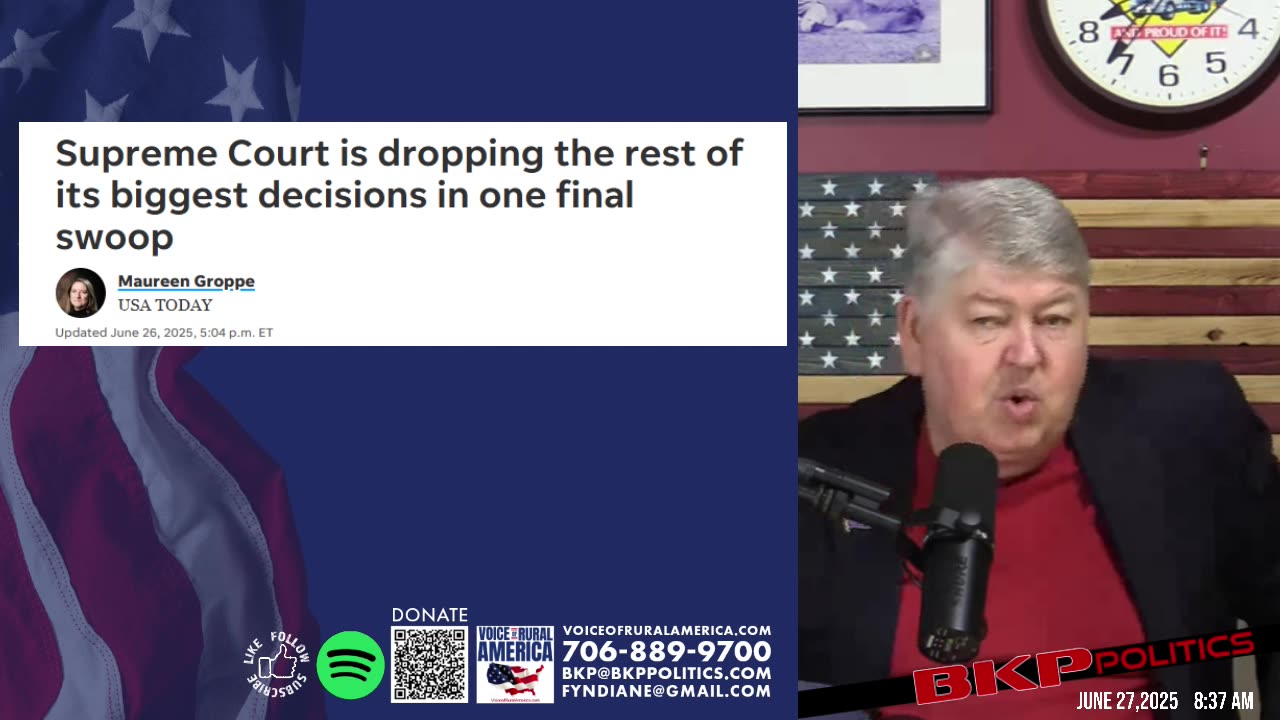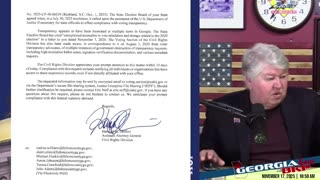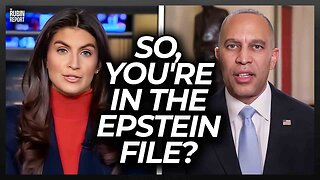Premium Only Content

Supreme Court’s 6-3 Rulings ROCK America
The Supreme Court’s 2024-2025 term is ending with pivotal 6-3 rulings, reinforcing its conservative stance post-Dobbs. South Carolina’s win to block Planned Parenthood from Medicaid funding sets a precedent for states to limit taxpayer support for abortion providers. More rulings to come on Trump’s birthright citizenship executive order, deemed likely unconstitutional. Maryland’s push to allow parents to opt out of LGBTQ books in schools gains traction, alongside Georgia’s efforts to remove such materials. The Court also set out to tackle conservative challenges to Obamacare’s preventive care mandates and an $8B internet subsidy program, likely upholding the latter. Racial gerrymandering cases in Louisiana could reshape congressional maps, impacting Black voting power and the 2026 midterms. Explore how these decisions could shift healthcare, education, and voting rights nationwide.
Today the Supreme Court ends their session with 6-3 rulings. This is a good court. This is the same court that gave us the Dobbs decision. Yesterday was a good day, that states can stop the Medicaid funding for Planned Parenthood. South Carolina led the way that if you are a Medicaid recipient that Planned Parenthood is not a medical provider.
Birthright citizenship: Trump’s executive order limiting birthright citizenship has been put on hold by judges across the country who ruled it’s probably unconstitutional.
Preventing Students from reading LGBTQ books and minors from viewing porn. Thank you Maryland for wanting to stop children from reading LGBTQ books. In Georgia there is a group that has been working for years to stop and get this material out of school libraries. This will be big if this will allow us to get it out of our schools.
The court will rule on conservative challenges to Obamacare and internet subsidies. The court is considering conservative challenges to Obamacare and to an $8B federal program that subsidizes high-speed internet and phone service for millions of Americans. The justices seemed likely to reject an argument that the telecommunications program is funded by an unconstitutional tax, a case that raised questions about how much Congress can “delegate” its legislative authority to a federal agency. Two Christian-owned businesses and some people in Texas argue that the volunteer group of experts that recommended the services health insurance must cover is so powerful that, under the Constitution, its members must be appointed by the president and confirmed by the Senate.
Racial gerrymandering versus Black voting power. A challenge to the LA congressional map by non-Black voters tests the balancing act states must strike, complying with a civil rights law that protects the voting power of a racial minority while not discriminating against other voters. The outcome will also determine if the state can keep a map that gave Democrats an advantage in the disputed district, a decision that could make a difference in what could be a close battle for control of the House in 2026 midterms.
In Georgia you think your congressional lines are settled but they are in appeal right now, and when this happens at the end of the day this could have a major impact on the lines. In Georgia what they have done is divide the black vote and put it into the republican blocks, and that is what they are looking at that they are not properly given the voting power for the racial minority. The outcome will also determine if the state can keep a map that gave Democrats an advantage in the disputed district, a decision that could make a difference in what could be a close battle for control of the House in 2026 midterms.
-
 18:12:15
18:12:15
Voice Of Rural America
2 days agoVoice of Rural America - REPLAY - November 17, 2025
5151 -
 56:05
56:05
The Rubin Report
1 hour agoDems Regret Epstein Files Release as Major Dem Names Come Out
5.18K28 -
 LIVE
LIVE
Nikko Ortiz
2 hours agoRage Baiting Is Real... | Rumble LIVE
366 watching -
 LIVE
LIVE
LFA TV
15 hours agoLIVE & BREAKING NEWS! | WEDNESDAY 11/19/25
4,016 watching -
 LIVE
LIVE
The Shannon Joy Show
1 hour ago“Quiet Piggy!” Trump Lashes Out At Reporter After Epstein Bill Passes Overwhelmingly In House!
123 watching -
 UPCOMING
UPCOMING
Grant Stinchfield
43 minutes agoDOJ’s Salacious Distraction: The REAL Epstein Intel Is Locked in Langley!
-
 LIVE
LIVE
LadyDesireeMusic
2 hours agoLive Piano Music & Convo & Requests
163 watching -
 LIVE
LIVE
Trumpet Daily
43 minutes agoTrumpet Daily LIVE | Nov. 19, 2025
364 watching -
 LIVE
LIVE
Viss
2 hours ago🔴LIVE - Pushing The Timer and Those in Our Path - Arc Raiders
166 watching -
 LIVE
LIVE
Daniel Davis Deep Dive
3 hours agoU.S. Missile Defense Deception /MIT Professor Ted Postol
47 watching